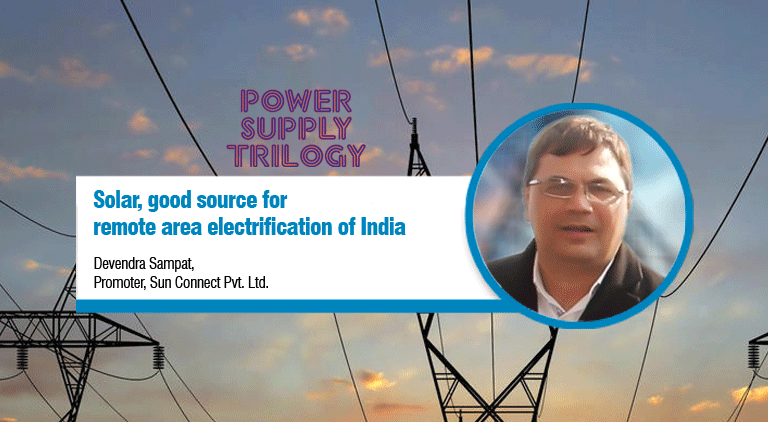Solar, good source for remote area electrification of India
By EPR Magazine Editorial November 18, 2019 2:43 pm IST
By EPR Magazine Editorial November 18, 2019 2:43 pm IST

Some strict measures have to be taken collectively by the full value chain of the industry inorder to take care of cyber attacks
In an interaction with Liesha tripathi, Devendra Sampat, Promoter, Sun Connect Pvt. Ltd., makers of solar module junction boxes, talks about how one of the key advantages for solar is its existence for a very long time and can be a good supplier of power.
Solar energy can help the focus on supply
The biggest advantage with solar energy is that at a very cost effective manner, you can have a standalone set-up to cater to a smallest hamlet of people in remote areas where electrical connections are difficult to reach. Probably, solar has an advantage in supply area as compared to other forms of energy. One of the key advantages for solar is its existence for a very long time. The same can’t be said for wind. In the absence of wind, generation of wind energy will get affected, and low availability of water can affect hydroelectricity. I feel that solar energy can be a very good source for remote area electrification of India.
Latest application usage without security mechanisms is one of the causes for rise in cyber attacks
Some strict measures have to be taken collectively by the full value chain of the industry inorder to take care of cyber attacks. In the absence of that, if anywhere there is a leakage of any data/information or any loop hole in database access or hardware areas, then it is susceptible attacks. We have to be very careful while using applications for our industry.
Solar panel isolation is required in case of flood
As an industry person, I would suggest, in case of flood, the major solar energy practices that should be done to protect solar panel is that the first and foremost panels have to be isolated from the array set-up. This is to ensure that the chances of human accidents happening due to electrocution should get drastically reduced.
Low tariffs is causing compromises for quality of module structures
It is a great possibility because as I have seen, the industry is more driven by the cost factor rather than it being driven by the humanity issue and longevity of the product issues or application issues. If you look at the scenario, a module is supposed to be IEC certified that gives a guarantee for next 25 years of working and producing energy, but the way things have been made now and the kind of companies coming into the market, there are major chances that the modules might not survive for the next 25 years. So, I have a personal feeling that rather than having IEC certification of the module, it is more convenient for the industry to have insurance for the modules’ working life and if there is a mechanism available for the same.
Devendra Sampat, Promoter,Sun Connect Pvt. Ltd.,
We use cookies to personalize your experience. By continuing to visit this website you agree to our Terms & Conditions, Privacy Policy and Cookie Policy.